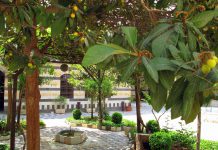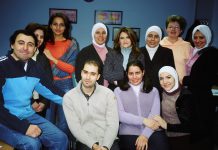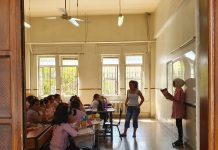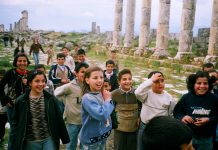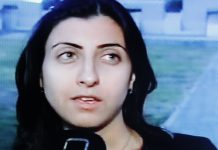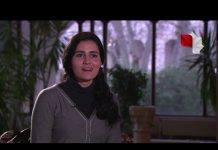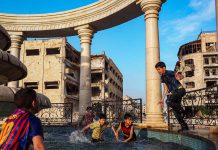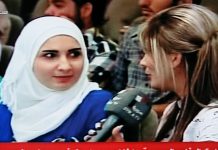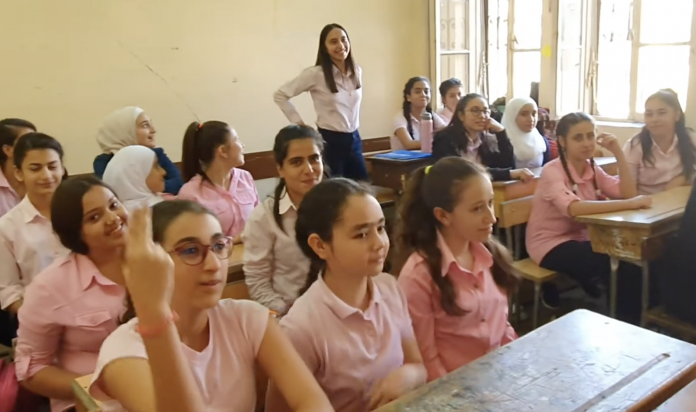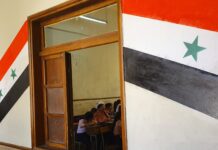The article below was first published by Pearls and Irritations, 11 August 2023
Returning to Syria in 2019, I visited a private girls high school in Damascus, close to where I used to work. Open to students from all faith backgrounds, Dar Al Salam School had once been a church and a home for nuns. In the years that I lived in Syria (2003 to 2005), I’d often see students returning home after school. They looked smart in their pink and blue uniforms; many of them wore a white hijab, others wore their hair out. To my eyes, they seemed as cheerful and confident as their Australian peers.
A BBC program on schools in Syria featured a similar-looking girls school. Filmed in pre-war Syria, the documentary demonstrates our commonalities with Syrians – people’s innate love for learning; and their capacity for joy, humility, and kindness.
So often my interactions with Syrian people, however fleeting, were heart-felt and direct. Just as I was, most foreigners in Syria were enchanted by the country and charmed by the people.
However, since the start of the ‘Arab Spring’, the human side of Syria has been mostly ignored in the West. Australia has followed our strategic allies into a war on Syria that has in the main deliberately ignored the concerns and humanity of millions of ordinary people. Today, the views of Syrian people, such as the students and teachers I met in Damascus, are not represented in the mainstream Australian media.
Most Syrians are familiar with their country’s history and know that France, the US, the UK and Israel have effectively been at war, in some form or other, with their country over many decades. Referencing historical records and the speeches of the late John F. Kennedy, Robert F. Kennedy Jr has detailed instances of US attempts to undermine Syrian governments. ’Oil’ and fears that Syria was moving toward the ‘Soviet camp’ mostly motivated them.
Today, US troops occupy a third of Syrian territory. When he was president, Trump didn’t hesitate to declare that he was keeping the troops in Syria “only for the oil“.
Miles Copeland, a CIA agent who helped orchestrate the 1949 military coup in Syria, acknowledged that the policies of the US State Department and the Pentagon could be at odds and that the State Department didn’t necessarily know what CIA agents were doing on the ground. ‘They didn’t want to be informed’, Copeland said.
In an attempt to undermine another Syrian government some years after that 1949 coup, the CIA and MI6 planned covert actions which included assassinations, border incidents and ‘an oil-fuelled invasion plan’. This wasn’t revealed to the public until nearly 50 years later.
But we don’t have to wait decades to be at least partially informed about US and UK interference in Syrian affairs today. For example, in 2020 The Grayzone detailed a massive propaganda operation against Syria waged by western governments, particularly by the UK. Such campaigns rely on the enlistment of disaffected Syrians. I once observed a personable American from Miami, who was a former colleague of mine at the British Council, distribute gifts to locals he befriended in parks. I didn’t doubt he was working for the CIA, but twenty years ago he seemed more like a character in a Graham Greene novel than someone who was contributing to the future suffering of a people.
How can we in Australia possibly understand the intricacies of a distant war in which our allies are closely involved?
For the 2017 issue of Beloved Syria, we asked Syrians to respond to the question: What has united Syrians and what can unite them again?
A 43-year-old female journalist in Damascus responded: ‘Syrians are united by their love for their homeland and their love for life. They …want a safe and secure life, and then they will be able to rebuild their country. Syrians will not let anyone occupy their country; they hate injustice, and slavery.’
An unabashed love for ‘country’ and an independent, proud outlook on life used to be common to the Syrians I encountered. It was in the air. On all my trips back to Damascus, it has been the ‘spirit’ of Syria and the warmth of its people that I have aimed to capture in images or in audio or video interviews – and I have especially aimed to photograph and interview the women of Syria.
Today, a high proportion of households in Syria are led by women. Nisreen, a teacher at Dar Al Salam School, explained when I met her in 2019 that war had brought about changes to the role of women: “…instinctively women were focused on sustaining the family and community. … They try to support the men… But through the crisis, overnight, let’s say, she found herself alone. She is the only breadwinner because she has lost her husband, father, … sons.”
Syrians – whatever their gender and allegiances – have suffered terribly in the past twelve years. But four years ago, few in Syria could have imagined how dire their living conditions would become following the imposition of extraordinarily harsh unilateral coercive sanctions by the US and other western governments, including our own.

‘Teacher Nisreen’, as she was known to her students, was a single mum with two daughters. These days, Syrian teachers earn about A$20 a month, while a kilo of meat in Syria would cost about A$60.
Professor Alena Douhan, the UN expert sent to Syria to investigate the impact of sanctions on the human rights of Syrians, said the sanctions were ‘suffocating’ Syrian people. She called for their lifting and questioned their legality. In an interview, she noted that even the head of a hospital in Syria earns little more than US$40 a month, less than half the cost of a monthly ‘food basket’ for a family of four. To cover the cost of food, rent, plus utilities and fuel (when available), people must take on two or more jobs. Inevitably, crime and corruption have become rife. (These days, Syrian households are supplied anything from fifteen minutes’ to one hour’s electricity every five hours, depending on where they live.)
When I was working in Syria, I was invited to BBQs and ate shish kabab in restaurants along with the locals. Then, life was ‘normal’. Of course, there was corruption and injustices occurred, but the threads that held Syrian society together were tight, rich, and complex. Their religious faith is important to most people in Syria, but their links to ‘country’ stretched back beyond Islamic and Christian times. (The story of ‘the heroic archaeologist who died defending Palmyra from Isil’, 81-year-old Khaled al-Assad, helps illustrate this.)
Four years ago, virtually every Syrian I spoke with was cautiously optimistic about the future. Life was getting back to some sort of normality after peace had been restored in most towns and cities. Only the editor of an independent newspaper expressed to me his fear of an approaching economic war.
Today, due very much to the harsh western sanctions and America’s control of Syria’s oil resources, a sense of despair grips the country. One friend told me that people quip, “Today is bad, but at least we can be sure tomorrow will be worse.”
In Australia, our busy lives; the financial pressures on us; the media-generated hatred of the ‘Assad regime’; the bias of our foreign policy establishment and of the mainstream media all discourage us from giving attention to the people of Syria. It means our ignorance, to some degree, contributes to the pain inflicted on them by unilateral sanctions.
But the problem really is that no mainstream Australian journalist has investigated in a rigorous, impartial manner the justifications for the sanctions, even though they are contentious. Nor has a mainstream journalist examined the devastating impact sanctions have on the lives of Syrians. Hence, our government can impose sanctions on Syria without any public debate or enquiry. (A freelance Australian journalist, Chris Ray, did visit Syria in 2019 to investigate the impact of sanctions, but his excellent article was ignored by the mainstream media.)
In one of his anti-war addresses, Martin Luther King said, “In international conflicts, the truth is hard to come by because most nations are deceived about themselves”. If we accept this as a fair observation, it can serve as a challenge to us in Australia. Why is it that our government and mainstream media ignore the suffering of Syrian people? In addition to self-interest and shortsightedness, could it be due to racism and a lack of care for a Muslim-majority country?
For Syrians, hope lies in the fact that – given time and effort – people outside their country will learn of the deleterious effect of sanctions, will question the justifications given for imposing them, and will see them as breaching the human rights of Syrians. Hope lies also in reestablishing diplomatic relations, at one level, and in establishing people-to-people connections that are apolitical, at another.
Syrians and Australians have so much in common – a love for music and singing, for a start. Jenny, a student at Dar Al Salam School, attributed her good spoken English partly to watching Youtube videos, but also to listening to her parents’ music: the Bee Gees, ABBA, and George Michael. One of her classmates enthusiastically sang ‘What Makes You Beautiful’, by One Direction, for me.
Though I do not claim a religion, I do have a prayer:
May empathetic connections between Syrians and Australians become the norm.
May the government lift sanctions Australia has imposed on Syria.
May Syrians be given the chance to rebuild their country and establish a new ‘normal’, one that can maintain the health of individuals, families and communities.
May Australia show humility and do nothing to undermine the efforts of Syrians to rebuild their country.
Susan Dirgham
President of Australians for Reconciliation and Truth Towards Syria (ArttS)

